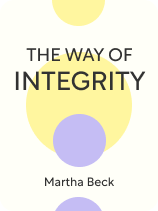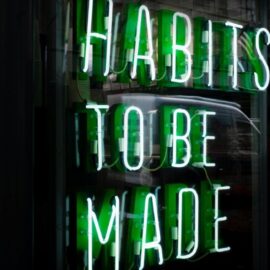

This article is an excerpt from the Shortform book guide to "The Way of Integrity" by Martha Beck. Shortform has the world's best summaries and analyses of books you should be reading.
Like this article? Sign up for a free trial here.
Do you feel like you’re living out of sync with who you truly are? Who are you, deep down? What do you really want out of life?
A book by Martha Beck, The Way of Integrity, is a guide to living in alignment with your true self. Beck argues that, deep down, you know who you want to be and what you want to do with your life. She contends that the greatest source of chronic misery is living out of alignment with these wants.
Keep reading for an overview of this book and understand Beck’s solution to chronic unhappiness.
Martha Beck: The Way of Integrity
Beck is a life coach, columnist, and best-selling author. She draws her lessons from her hard-won experience as a woman who overcame deep childhood trauma, left the Mormon Church, embraced her sexual orientation despite the values she grew up with, and raised a son with Down syndrome. As a life coach, she’s helped numerous clients with their own struggles and draws her advice from their experiences as well.
Our overview of this book by Martha Beck, The Way of Integrity, covers her work in two parts:
- Part 1: What Is Integrity? explains Beck’s theories about what it means to live with integrity, how you might lose your way, and the heavy emotional toll of living at odds with yourself.
- Part 2: The Process of Realignment explores Beck’s four-step process for getting back into alignment with your personal nature: discovering your false beliefs, challenging those false beliefs, living with integrity, and transforming yourself.
Part 1: What Is Integrity?
Beck defines integrity as the psychological state of living in accordance with your own personal nature.
What Is “Your Personal Nature”?
Beck argues that, at your deepest level of self, you know what will make you happy and what kind of life you want to lead. You also know how you feel, and what is true about your own life. This deepest level of self is your personal nature.
Living in Accordance With Your Personal Nature
While each of us has a personal nature, our daily life is not always aligned with this nature. Beck maintains that there are three core components to living in accordance with your personal nature:
- Accept your personal knowledge.
- Accept your feelings.
- Spend your time on what you love.
How Your Culture Pulls You Away From Your Nature
Beck argues that you grow up as a member of society where you consciously or unconsciously absorb messages about how to live and who to be. When you internalize these messages, they solidify into beliefs. False beliefs pull you away from being aligned with your personal nature, which may want something else entirely.
Beck identifies two ways culture may pull you out of alignment with your nature. Let’s take a look at each.
You Chase Goals You Don’t Really Want
Your culture may teach you that pursuing wealth, status, and “success” (however defined) will make you happy. Then you might put an enormous amount of effort into achieving those things only to find that they haven’t actually made you happier. That is because these goals are not necessarily aligned with your personal nature.
You Try to Be Someone You’re Not
Beck argues that you may absorb lessons from your culture about who has value and who does not. In an effort to be someone who has value, you may then try to change who you are to conform to this standard.
How Living Out of Alignment Makes Us Unhappy
Beck argues that misalignment is the source of most—if not all—chronic psychological misery in our lives. It’s very hard to find happiness if you’re not connecting and listening to your personal nature—the part of yourself that knows what would make you happy.
How Can You Tell If You’re Misaligned?
Beck encourages you to think of your emotional suffering as a natural alarm system. Your body is telling you that something isn’t right in your life and you need to change. She explains four types of suffering that indicate you might be living out of alignment with your nature:
- Confusion: Your life just “feels off” and you’re not sure why.
- Aimlessness: It feels like life is just slipping by and none of it adds up to anything.
- Emotional misery: You find yourself feeling sad all the time without being able to explain why.
- Consistent failures in your career or relationship: It seems like the important things in your life just keep falling apart no matter what you do.
Part 2: The Process of Realignment
Beck argues that the only way to overcome the chronic misery of misalignment is through a process of realignment. We’ll explore Beck’s four stages of realignment: discovering our false beliefs, challenging those false beliefs, living with integrity, and transformation.
Realignment Stage #1: Discover False Beliefs
Beck argues that the path to realignment begins with discovering and recognizing the false beliefs we acquire from our culture.
1) Find a Teacher
Beck argues that many people first discover their false beliefs by encountering a role model or teacher who can help them get in touch with their nature. She writes that you can recognize a good “integrity mentor” because they possess three important qualities:
- They aren’t bound by cultural rules.
- They will captivate you.
- They will put you in touch with your nature.
While discovering an external teacher may be an important step in your process, Beck argues that the ultimate goal is to get in touch with your inner teacher.
2) Move Inward Toward Your Psyche’s “Forbidden Zones”
Beck argues that you can discover your false beliefs by moving inward toward the painful places in your mind where you’re afraid to go. You can usually tell where your forbidden zones are because these are the topics in your life that make you anxious to even think about.
Beck argues that, at your deepest level, you want to live with integrity. This motivation will help you overcome the challenges of entering these terrifying places. Once you have entered these painful places in your psyche, you will begin to notice the thoughts and beliefs that are causing the pain.
3) Observe Your Internalized Beliefs
Beck advises you to start by simply observing your painful thoughts and feelings. Get to understand your feelings of discomfort and the kinds of beliefs that might be associated with them.
Realignment Stage #2: Challenge the False Beliefs
Once you begin to recognize these false beliefs, it’s time to start challenging and overcoming them. Even though you might consciously understand that something isn’t true, it can still feel true, and it is these feelings that you’ll have to change.
Question False Beliefs
Drawing on the work of self-help author Byron Katie, Beck offers two strategies for overturning false beliefs:
- Ask yourself—can you be absolutely sure it’s true?
- Reverse the formula. Beck also recommends challenging false beliefs by inverting the statement. She recommends testing out new beliefs by switching out words for their opposites or reversing word order to come up with a new meaning. For example, if your false belief is, “I can’t be happy unless other people love me,” you might switch up to “I can be happy because I love other people.” If the reversed belief feels more true, then you might have stumbled on a way out of the false belief.
Recognize Your Inner Truth
Beck argues that you can distinguish between inner truths and false beliefs by paying attention to your body and moods. She identifies four qualities you experience while discovering an inner truth:
- Physical relaxation
- An “aha” moment
- Feeling of openness
- Feeling of freedom
Realignment Stage #3: Live With Integrity
Once you free yourself from false beliefs and understand your inner truths, then you can begin aligning your life with these truths. We’ll cover Beck’s five techniques for living with integrity.
1) Commit to Telling the Truth
When you live in your false beliefs internalized from your culture, you are not just lying to yourself—you also have to lie to family, friends, and colleagues. Living your truth will require telling it to others and making them understand who you really are. She cautions you to expect pushback, especially if living your truth requires violating the rules of your culture.
2) Focus on Making Small Adjustments
Beck also encourages you to realign your life by changing one small thing at a time. She stresses that aligning your life with your inner truth may take a long time and a lot of work, and you can’t expect to achieve all of it at once.
3) Focus on Your Yearning
Beck explains that, if you find yourself stuck while trying to get your life in alignment, it helps to focus on your deepest yearning. This yearning comes from your personal nature and tells you what you want to be doing with your life. It also provides the motivation you need to make hard changes like telling the truth with high social risks or making consistent small changes to realign your life.
4) Enjoy the Benefits of Integrity
As you get closer to realignment, you will begin to feel more at peace with yourself. You will experience a greater sense of wholeness and well-being. Learning to love and enjoy this lifestyle will provide further motivation to continue the difficult process of realignment.
5) Forgive Yourself for Violating Your Integrity
Finally, as you get your life in alignment with your deepest nature, Beck highlights the importance of forgiving yourself for falling out of alignment with your integrity. Beck argues that the best thing you can do is let go of the past while forgiving yourself for the false beliefs you internalized from your culture.
Realignment Stage #4: Transformation
Beck argues that, as you practice integrity, you might find yourself changing in ways that you didn’t expect. She gives four pieces of advice for navigating this stage in your journey.
1) Embrace the Unknown
Beck encourages you to allow yourself to be open to aspects of life and experience that you don’t fully understand. She argues that living in alignment with your true nature won’t simply help you become healthier and happier—it may also lead you to a higher spiritual awareness. This will require an openness to unknown experiences.
2) Embrace Unity and Connectedness
Beck argues that, the more we get in touch with our true natures, the more we will experience belonging and connection as part of a vast, interconnected unity.
3) Find a Higher Purpose
Beck notes that, as you become more aligned with yourself, you may discover opportunities to contribute and help others that would have never occurred to you while you were living in misalignment. You’ll become less self-focused and more other-focused, and you’ll naturally become more alert to opportunities to contribute.
4) Spread Alignment to Others
Beck describes the process of spreading alignment from yourself to others as similar to the repetition of shapes in a fractal. Once you begin living in greater alignment with yourself, you have the opportunity to be that teacher for others.

———End of Preview———
Like what you just read? Read the rest of the world's best book summary and analysis of Martha Beck's "The Way of Integrity" at Shortform.
Here's what you'll find in our full The Way of Integrity summary:
- How to know if you're living in alignment with your true self
- How messages from our culture tell us to chase things we don't really want
- The four stages of realigning your life to find happiness






